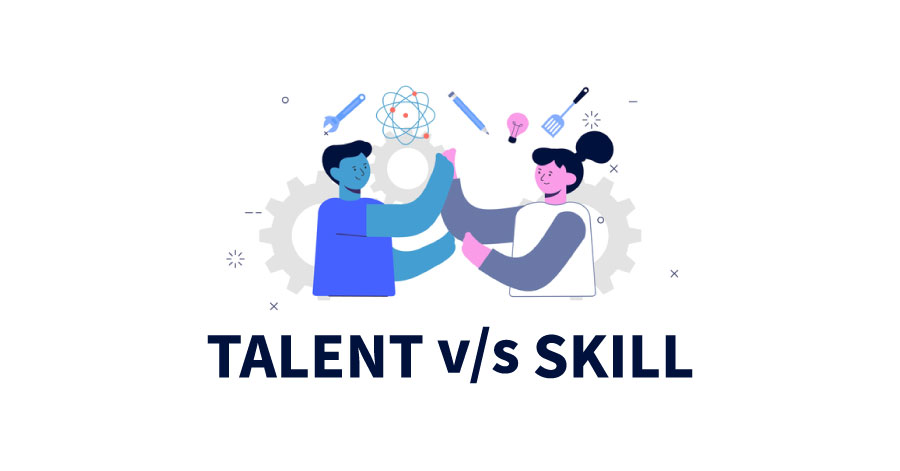Talent vs Skill with Examples Differences & Similarities
Dedication, hard-working, passion, and vision are the four key elements of success. In addition to these four elements, two other things can have a very good effect in reaching success. One of them is talent and the other is a skill.
There is a lot of debate, discussion, criticism, myth, etc. about talent vs skill. Yet their importance is immense. From that context, the discussion of skill vs talent is very demanding. In this article, we will try to discuss these issues in detail.
It is very important to know what talent is and what skill is before going deep into the subject matter. So at a glance, let’s get an idea of the issues.
What is Talent?
Talent is such quality and aptitude which comes inborn. It is a natural ability to do something. However, let’s know the origin of the talent word before knowing what talent is.
The Origin of the Word Talent
If we want to see the origin of the word TALENT, we must go to the Greek language. It originates from the Greek word TALANTON which is a figurative use with biblical allusion to the parable of the talents (Matthew 25:14–30). Later the word was used in Latin to mean ‘weight, the sum of money’, the Latin word is TALENTUM whose plural is TALENTA. The word was later adopted by Old English as TALENTE or TALENTAN. Finally, it comes in Modern English with the familiar TALENT spelling. The meaning of TALENT word is ‘natural aptitude’.
Definition of Talent
Many scholars try to give definitions of talent. In this section, we’re mentioning some important of them. Such as:-
According to Stanisława Borkowska (2005), a talent is an enterprising person with highly developed potential, creativity, being the lever of growth in shareholder value.
According to Aleksy Pocztowski (2008), talent is a leadership trait, a high tolerance to change, strategic thinking, an entrepreneurial attitude, the ability to persuade, a performance-oriented approach, teamwork, emotional intelligence, flexibility, and highly developed specialist technical skills.
Joanna Moczydłowska (2010) said that talent mainly consists of three important things. Such as- First extraordinary intellectual skills (specialist and general), second a creative attitude (flexible thinking and acting, uncertainty and ambiguity, originality, change, tackling unconventional problems, and high tolerance to risk), and third a commitment to work (hard-working, persistent in pursuing goals, and self-disciplined).
At last, we can define talent in such a way; talent is an inner quality and natural aptitude that emerges effortlessly.
Talent Life Cycle
From the point of view of Human Resource Management (HRM), five characteristics of talent can be noticed. Many people also say these four features of the Talent Life Cycle. These are-
- Talent Acquisition
- Performance Management
- Career Development
- Off-boarding & Succession Planning
Clearing the fundamental discussion is very important before going to the topic. Till now, there are sustained such things.

What is Skill?
Skill refers to an ability that can be applied to a specific task and can be accurately assessed. Now we will take a look at the origin of the word skill and what is called skill, along with the definition of some scholars.
The Origin of the Word Skill
The term SKILL first appeared in Old Norse. The word was then spelled SKIL, which was used to mean ‘discernment, knowledge’. Later in Old English, the word became SCELE. Lastly, it takes its current form in Modern English. Which means ‘the ability to do something well; expertise ’.
Definition of Skill
This section has shown some authentic definitions of skill. Some scholars’ definitions have been mentioned here as a reference and finally draw a conclusion to understand easily.
According to Kijpokin Kasemsap (Instructional Systems and Educational Technology, 2017), skill is the ability to effectively do something arising from training, practice, or talent.
According to Francesca Costanza, (Managing Patients’ Organizations to Improve Healthcare: Emerging Research and Opportunities; 2020) skill is the ability to apply knowledge and know-how to accomplish tasks and solve problems.
Noelia Araújo Vila, Diego R. Toubes, Arthur Filipe de Araújo, and Jose Antonio Fraiz Brea define the skill on their research paper – Human Capital and People Management in the Tourism Industry, 2021. They said that skill is an ability and capacity acquired through systematic, deliberate, and sustained effort to adaptively and smoothly carry out complex activities or job functions involving ideas, things, and people.
In the light of the various statements of the scholars, it is understood that skill is a special form of capability and ability to do something well or to perform a specific action and produce concrete results.
SECRET Skills Set
Dan Buckley (2008) was designed the SECRET skills set through PbyP (Personalisation by Pieces). This framework is considered the complete skills set. Based on the initial letters of the word SECRET, six attributes are included. These are-
- S = Self-Managers: To be organized; Go for it, finish it; manage risk; manage emotions.
- E = Effective Participators: To identify issues; find solutions; persuade others; get involved.
- C = Creative Thinkers: To imagine, make links, question assumptions, and take creative risks.
- R = Reflective Learners: To plan-do-review, invite feedback, set yourself challenges, and share learning.
- E = Independent Enquirers: To explore a question, evaluate evidence, stay objective, and reach conclusions.
- T = Team Workers: To take responsibility, build team strengths, manage the team, and evaluate the team.
This was the basic idea about skill. It was very important to know that before discussing.
Talent vs Skill – Difference between Talent and Skill
There is described the difference between talent and skill through a table. This table has shown the specific dissimilar between talent vs skill. Let’s see-
| BASIS | TALENT | SKILL |
|---|---|---|
| Origin | From Greek word | From the Old Norse word |
| Meaning | Natural aptitude | Ability to do something |
| Nature | God gifted | Something to develop |
| What is it? | An inner quality and natural aptitude that emerges effortlessly | The ability to do something well; expertise |
| Owned by | Few people only | Anyone can possess through practicing, learning, and being hard-working |
| Guidance | Coaching | Training |
| Aspect | Natural | Nurtured |
| Needed | Recognition | Development |
| Scenario | From within | From without |
| Creation | Born with | Arrived later |
| Consideration | As natural skills | Demonstrated talent |
| Genre | Liberal | Trapped |
| Discover | Uniqueness | Ordinary |
| Example | Singing | Computer programming |
Skill vs Talent – Difference between Skill and Talent
In the meantime, we have presented a table to see the difference between skill and talent. The table is just a bird’s eye view of the content. Now we will observe the discussion on the key points of the dissimilarities of skill vs talent. Such as:-
- Talent means natural aptitude, at the same time skill means the ability to do something well.
- After practice and hard work, skill can acquire but talent comes as God-gifted.
- Talent may be sharper through coaching, as an alternative training for skill.
- For skill needs to nurture, quite the reverse talent is completely natural.
- Talent is an inner matter whereas skill possesses through practicing, learning, hard-working, and similar activities.
- Skill may be trapped. On the other hand, talent is liberal.
- Talent comes born with. On the flip side, skill arrives later.
- Skill is demonstrated talent, oppositely, talent is inherent skills.
- In the view of the scenario, talent is from within, conversely, skill is from without.
- Some people have a certain number of talents. On the contrary, skill can be mastered by anyone through proper hard work and practice.
- Talent discovers a unique result. Nevertheless, skill discovers mediocrity instead of uniqueness.
Read more: Difference between Rows and Columns
What are the Similarities between Talent and Skill?
In the discussion of talent vs skill, there are shown similarities between talent and skill. After this explanation, anyone can absorb a clear understanding of skill vs talent. Let’s go to the discussion.
- Through skill and talent, each individual’s personal growth help to improve gradually.
- Strongly living in commercial surface, talent and skill use widely.
- Skill and talent are the same things from an ability perspective.
- Talent is more established in the existence of skill.
Which is more Important, Talent or Skill?
At this stage of the discussion of talent vs skill, we will discuss the importance of talent and skill. In general, it is almost impossible to reach the level of people who are talented alive, and kicking. Because of this, what they do is often at a noticeable level or at its best. Without hard work, any talent can be useless. A skilled and hard-working person can reach the same level of generosity as a talented person. Hard work always reigns over the talented. This is why it is said that hard work beats talent.
End of the Line
Observing the overall discussion, it is understood that talent is different from skill. This is different because talent is an innate quality. On the other hand, skills can be acquired through various exercises after birth. However, the relationship between skill and talent can be noticed in the context of skill vs talent or talent vs skill; and that is hard work. Just as skills are acquired through this hard work, so too can talent be sharpened. Sometimes, proper and tactful practice and hard work beat talent.




I take issue with “god given”. Be accurate. Talent is genetic, not doled out by some bearded dude in the sky.